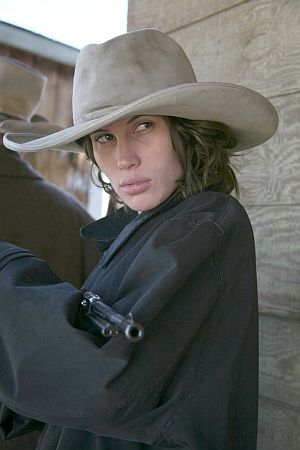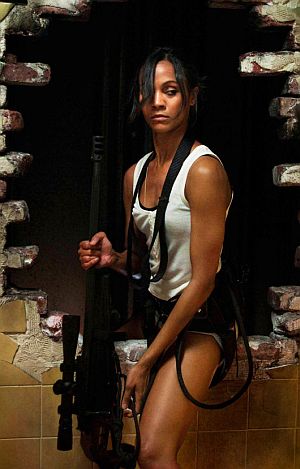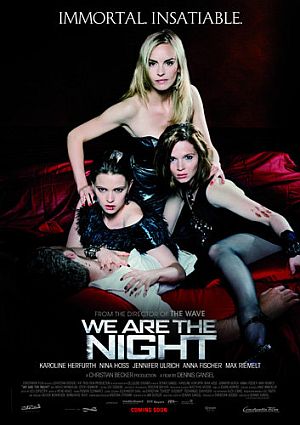★★★½
“Hannie Caulder with less cleavage. And no Christopher Lee.”
 The Asylum studio are infamous for producing ‘mockbusters’ – straight to DVD look-alikes of big-budget movies, designed to benefit from their publicity budgets. These have included their own versions of Sherlock Holmes and War of the Worlds, but they do make their own original works, including cheesy delights such as Mega Python vs. Gatoroid, starring 80’s popsters Tiffany and Debbie Gibson. They come in for a lot of flak as a result – some justified, some not, for this is neither mockbuster nor cheesy, and is surprisingly solid, if you want a straightforward Western tale of revenge. Selina Stevens (Mears) has to watch as her husband and two young sons are killed by Lee Horn (Mead) and his gang; she is brutally raped and left for dead, beginning a decline into alcoholic despair. Having reached bottom, she meets bounty-hunter Frank Allison (Van Dyke), and asks him to teach her how to shoot – conveniently, just as Horn’s crew start to make their way back to town. The townsfolk’s repeated affirmations that they feel safer with Frank around, might have been a bit premature.
The Asylum studio are infamous for producing ‘mockbusters’ – straight to DVD look-alikes of big-budget movies, designed to benefit from their publicity budgets. These have included their own versions of Sherlock Holmes and War of the Worlds, but they do make their own original works, including cheesy delights such as Mega Python vs. Gatoroid, starring 80’s popsters Tiffany and Debbie Gibson. They come in for a lot of flak as a result – some justified, some not, for this is neither mockbuster nor cheesy, and is surprisingly solid, if you want a straightforward Western tale of revenge. Selina Stevens (Mears) has to watch as her husband and two young sons are killed by Lee Horn (Mead) and his gang; she is brutally raped and left for dead, beginning a decline into alcoholic despair. Having reached bottom, she meets bounty-hunter Frank Allison (Van Dyke), and asks him to teach her how to shoot – conveniently, just as Horn’s crew start to make their way back to town. The townsfolk’s repeated affirmations that they feel safer with Frank around, might have been a bit premature.
Ok, ‘original’ might be a bit of a stretch, as the storyline is more than a bit reminiscent of Hannie Caulder [which I must get round to reviewing at some point], though sensibly reins back the glamour Raquel Welch provided there. On its own merits, however, this is based on a solid trio of central performances, with Mead particularly memorable as the black-hearted thug – in an interesting twist, it’s revenge which also triggers his initial assault on Stevens’ family. Selina’s transition to a gunslinger is nicely handled; she doesn’t exactly become a sharpshooter – but when opportunity presents itself, can shoot a fairly stationary target at shortish range, which is credible. Against this its low-budget nature is highly-obvious, with the “town” inhabited by about 12 people, and the action in general could have been spliced in from any randomly-selected 1950’s oater.
This remains a decent tale, satisfactorily told, with interesting characters, good performances and more than a local resonance, given its placedropping of Arizona names. And in case you’re wondering, no, there are not six guns in the movie, despite the title [depending on the count, there might be five or seven…] Still, you’d be hard-pressed to argue that this doesn’t fall in the upper echelon of the studio’s movies: this kind of thing should escape from The Asylum more often.
Dir: Shane Van Dyke
Star: Sage Mears, Barry Van Dyke, Geoff Meed, Greg Evigan





 There are moments where this seems to have the potential to break out beyond its story, but once you get past the strong central core, the script has very little to offer. Cataleya (Saldana) narrowly escapes death when her parents are killed on the orders of their gangster employer, Don Luis. She flees from Colombia to Chicago and is raised by a family friend, but never forgets where she came from, and has revenge on her mind. Grown-up, she becomes a hit-woman, but has a side-project of payback. She has an occasional boyfriend (Vartan) who knows little about her, and a dogged FBI agent (James), intent on tracking down the mysterious, elusive killer. Y’know: all the usual baggage that goes along with being an assassin.
There are moments where this seems to have the potential to break out beyond its story, but once you get past the strong central core, the script has very little to offer. Cataleya (Saldana) narrowly escapes death when her parents are killed on the orders of their gangster employer, Don Luis. She flees from Colombia to Chicago and is raised by a family friend, but never forgets where she came from, and has revenge on her mind. Grown-up, she becomes a hit-woman, but has a side-project of payback. She has an occasional boyfriend (Vartan) who knows little about her, and a dogged FBI agent (James), intent on tracking down the mysterious, elusive killer. Y’know: all the usual baggage that goes along with being an assassin. After she gets word, back in their native Russia, that her sister has been killed in Toronto, Karma (Bechard) vows revenge on those responsible. This pulls her in to a seedy, dangerous world of sex trafficking, with women being lured from Eastern Europe to the West, with the promise of legitimate jobs, only to forced on arrival into working as strippers or worse, by the criminal elements who organize and run the business, with a fist of iron. As Karma stabs, shoots and bludgeons her way up the chain of command, those at the top grow increasingly restless. Initially, they think a rival gang is responsible, but the evidence eventually convinces them Karma is, indeed, a bitch,
After she gets word, back in their native Russia, that her sister has been killed in Toronto, Karma (Bechard) vows revenge on those responsible. This pulls her in to a seedy, dangerous world of sex trafficking, with women being lured from Eastern Europe to the West, with the promise of legitimate jobs, only to forced on arrival into working as strippers or worse, by the criminal elements who organize and run the business, with a fist of iron. As Karma stabs, shoots and bludgeons her way up the chain of command, those at the top grow increasingly restless. Initially, they think a rival gang is responsible, but the evidence eventually convinces them Karma is, indeed, a bitch,
 Lena (Herfurth) lives on the edge of society: stealing from other criminals, and running from the cops. But her life changes forever, when she comes to the attentions of Louise (Hoss), a rich socialite, who runs with her pack of friends. Louise is actually a centuries-old vampire, who sees something in Lena’s eyes, something for which Louise has been searching for many decades. She bites Lena, and her transformation into a creature of the night begins. It’s not without its issues: to force Lena to come to terms with her new-found strength and speed, she is handed over to a pimp, a scenario which turns into a blood-bath. While Lena does adapt, the police investigate the killings and Tom (Riemelt), who knew Lena from her street days, realizes there’s a connection between her and what happened.
Lena (Herfurth) lives on the edge of society: stealing from other criminals, and running from the cops. But her life changes forever, when she comes to the attentions of Louise (Hoss), a rich socialite, who runs with her pack of friends. Louise is actually a centuries-old vampire, who sees something in Lena’s eyes, something for which Louise has been searching for many decades. She bites Lena, and her transformation into a creature of the night begins. It’s not without its issues: to force Lena to come to terms with her new-found strength and speed, she is handed over to a pimp, a scenario which turns into a blood-bath. While Lena does adapt, the police investigate the killings and Tom (Riemelt), who knew Lena from her street days, realizes there’s a connection between her and what happened.